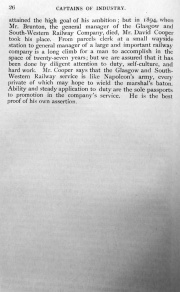General Manager of the Glasgow and South Western Railway
From ‘Captains of Industry’ by William S. Murphy. Published 1901.
MR. DAVID COOPER, GENERAL MANAGER, GLASGOW AND SOUTH-WESTERN RAILWAY.
A GREAT painter is credited with saying, "Let my work live though my name be forgotten," and the echoes of the ages have answered him with the gift of undying fame. Whether his work lives or not, his speech about it is certain of long remembrance—a fact worth reflecting on. Such lofty sentiment accords well with our traditions of poetic and artistic workers, and might sound rather magniloquent from the lips of an engineer or builder. There is no real reason why. On the contrary, many practical workers and men of business practise a self-forgetfulness all the greater because it is unprofessed and unconscious. They are not much concerned about fame and the world's opinion, but identify themselves with their work, happy if it succeeds, regarding talk of what they have done as mere hindrance and botheration.
When there is occasion or call, Mr. David Cooper will discourse on the history and working of the Glasgow and South-Western Railway with an earnest directness that at once vividly portrays the subject and reveals his love for it; but the life-story and achievements of the general manager of the line he will not discuss. Perhaps the shortest autobiography on record is that given by Mr. Cooper to a Press representative in 1899:— "I commenced my career over thirty years ago on the Glasgow and South-Western line, and was appointed to my present position five years ago." Mr. Cooper does not become brusque in order to be brief; his tone is calm and his manner courteous; he flashes into your eyes a kindly glance; but he has decided the matter, and there is an end of it. He is master of himself, this tall, trim-built, soldier-looking man, and can easily afford to be friendly with everybody else.
The general manager of the Glasgow and South-Western Railway is an Ayrshire man, and a son of the people. In the wide parish of Dalmellington, on the banks of "Bonnie Doon," stands the little village of Waterside, a place of about 1400 inhabitants. Here in 1855 David Cooper was born. The Ayr and Dalmellington line touches on the village, and at the early age of twelve the future general manager entered the Glasgow and South-Western service as parcels clerk at Waterside Station, at a salary of £13 a year. His official title was parcels clerk, but the boy's duties were, as can be imagined, varied and not always pleasant. Promotion, however, was not long in coming, and when barely fourteen years old he took up life in lodgings at Maybole, and in that busy little station undertook the work of booking-clerk. It was there, in the leisure of his evening hours, that he undertook the self-imposed task of educating himself, so far as he could do so. We have no liking for the "be good and get on" maxim; but the clear intelligence whirls grasps offered opportunity and diligently seeks self-improvement is worthy of praise and imitation.
In 1872 Mr. Cooper was transferred to Glasgow, as a clerk in the superintendent's office, at a salary of £1 per week. On this slender income he not only contrived to live in modest comfort, but also scraped together enough money to pay fees for the Athenaeum educational classes. From the classes in that valuable institution Mr. Cooper acquired equipment useful at the time and of service to him in his subsequent career — arithmetic, shorthand, and other branches of commercial education. It is to be noted that the future general manager's studies lay in the direct line of his daily work, and from this the inference is clear that he was no less diligent, active, inquiring, and intelligent within the office than outside. We make no venture on the inference; for in 1885, when the assistant to the general manager left the service for a higher post on an Irish railway, Mr. Cooper was selected to succeed him. Mr. Cooper may have had his romance of faithful love in years of waiting like many another ambitious young man. Suffice it to say, that in this the year of his most decisive promotion he married the lady of his choice.
Four years afterwards Mr. Mathieson, the then superintendent of the line, obtained the position of Commissioner of Railways in Queensland, and the general manager's young assistant stepped into the vacancy. This was perhaps the testing point of Mr. David Cooper's career. He had now a portfolio. Formerly obedient to the orders and directions of superiors, he had now attained to command in his own authority. But in obeying he had learned the secret of commanding, for his success as superintendent of the line was unqualified.
Though so successful and worthy, Mr. Cooper had not yet attained the high goal of his ambition; but in 1894, when Mr. Brunton, the general manager of the Glasgow and South-Western Railway Company, died, Mr. David Cooper took his place. From parcels clerk at a small wayside station to general manager of a large and important railway company is a long climb for a man to accomplish in the space of twenty-seven years; but we are assured that it has been done by diligent attention to duty, self-culture, and hard work. Mr. Cooper says that the Glasgow and South-Western Railway service is like Napoleon's army, every private of which may hope to wield the marshal's baton. Ability and steady application to duty are the sole passports to promotion in the company's service. He is the best proof of his own assertion.




